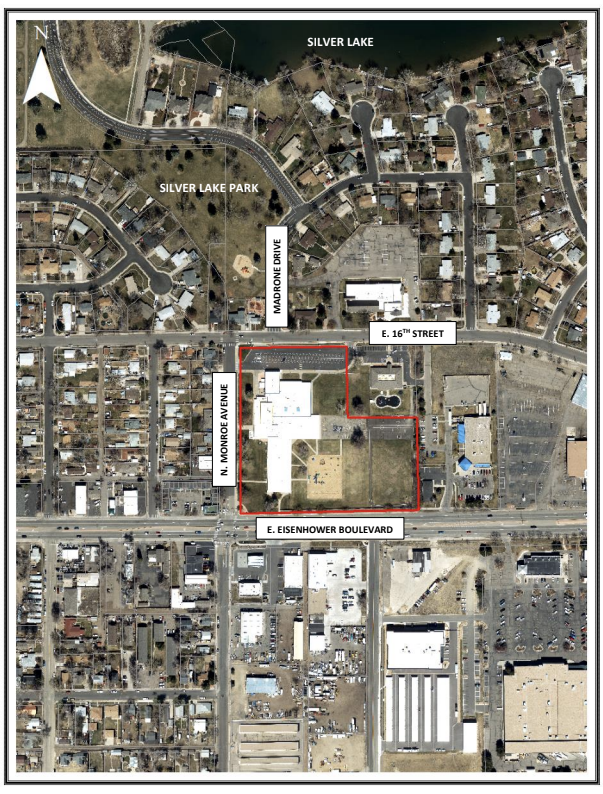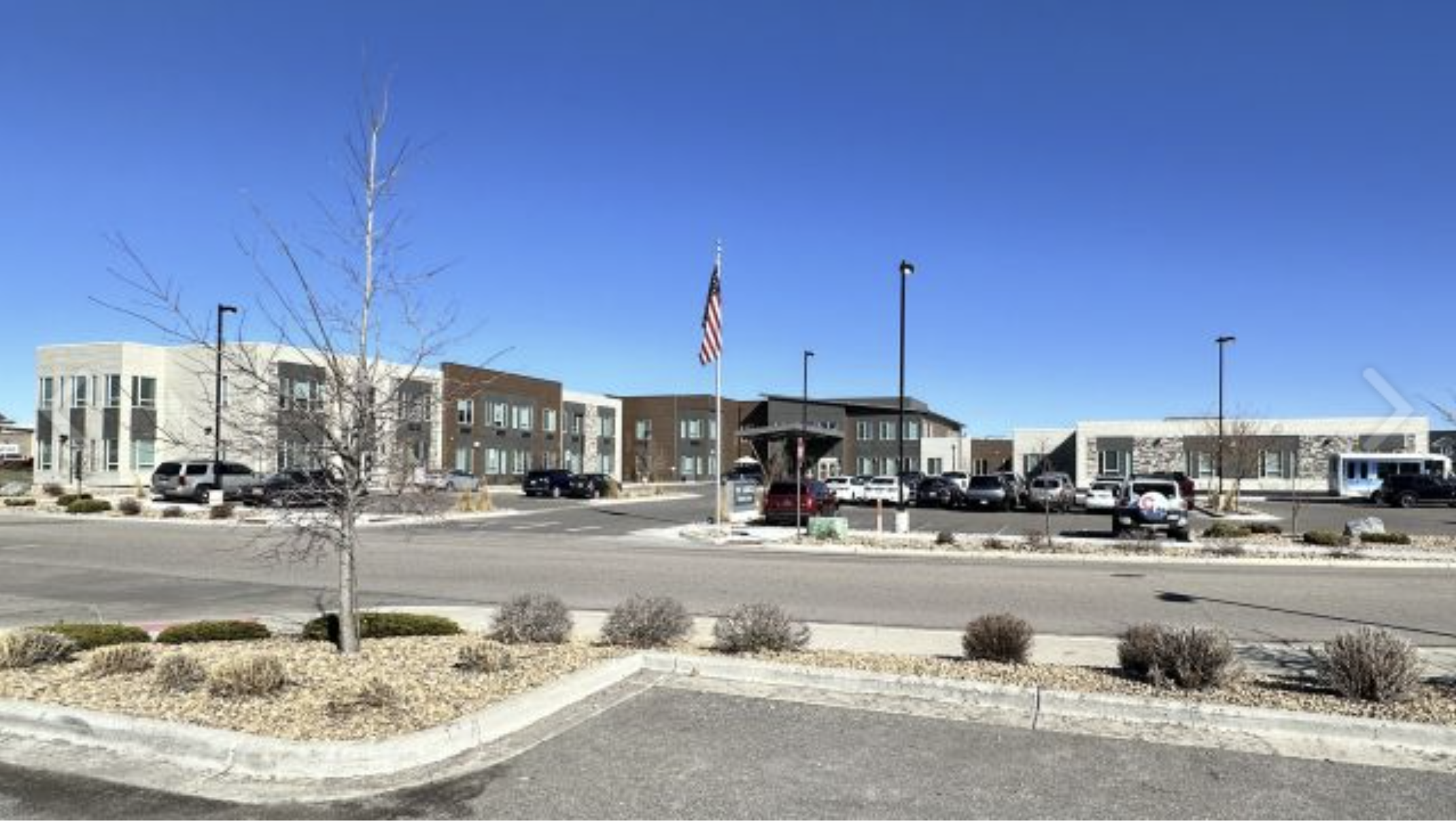Loveland council rejects developer’s plan for Monroe school site

LOVELAND – After hearing impassioned pleas from nearly two dozen city residents, the Loveland City Council late Tuesday night voted to oppose a plan to demolish a shuttered elementary school and replace it with a mixed-use commercial and residential development along the East Eisenhower Boulevard corridor.
The 7-2 vote largely crossed ideological lines, with Mayor Pro Tem Don Overcash siding with Mayor Jacki Marsh against the plan. Only council members Steve Olson and Richard Ball supported the proposal by United Property Development LLC of Minneapolis and Denver that would have demolished the nearly 60-year-old Monroe Elementary School and replaced it with commercial buildings and multifamily housing in buildings up to six stories tall.
The Thompson School District had decided last fall to close Monroe Elementary School in May because of declining enrollment, and had agreed to sell the 6.6-acre tract to United Property for $6 million if it could develop the site. In turn, United Property requested that the city amend its 2016 comprehensive plan to allow the mixed use and rezone the tract from its public-quasi-public designation for the school to corridor commercial for a planned unit development and “enhanced overlay corridor,” a designation meant to encourage mixed-use development along Loveland’s heavily traveled routes including Eisenhower, the designated east-west route of U.S. Highway 34 through the city.
SPONSORED CONTENT
That zoning would allow a maximum density of 60 units per acre and building heights of up to 90 feet. The developer had asked the city for 55 units per acre and buildings 80 feet tall, but then, responding to concerns from neighbors about traffic, privacy, parking and changes to the character of the nearby Silverlake neighborhood, reduced its height request to 75 feet.
The developer pledged what it called “attainable rents” starting at around $1,700 a month in a mix of studio, one- and two-bedroom apartments, contending that the project’s increased density — between 236 and 275 units — would be required in order to generate enough scale to provide affordable units at below-market rents. It was willing to price 5% of the units for tenants earning 80% of area median income and requested no subsidies from the city for inclusion of affordability.
Despite the concessions, the Loveland Planning Commission voted 6-2 on July 24 to oppose changes to the comprehensive plan and unanimously to reject the rezoning. However, city staff decided to bring the proposed development to the City Council for reconsideration; on Tuesday night the opposing neighbors again showed up en masse.
After hearing the complaints and acknowledging that he’d been “reading the room,” Scott Peterson, United Properties’ vice president for hospitality and office development, offered a further concession: He’d be “voluntarily willing to limit profitability” by further reducing units per acre to 50 and maximum building height to 65 feet.
The council majority, however, wouldn’t budge, prompting a frustrated Councilor Steve Olson to exclaim, “They took 15 feet off and that’s not enough for you?”
Olson contended that the planning commission had erred in its rejection of the development and instead should have brought the citizens and the developer together early on to collaborate.
“Why do we have a code,” he asked. “Do we just throw our land use code out and say to heck with it? These folks have complied with it. Our responsibility is to hold up our standards, our code, and say if builders are complying with that, we should approve it.”
While agreeing that “we have zoning tools and development tools to help us meet the housing needs in our community,” Overcash, often a champion for responsible development in Loveland, said that “just because we have the tools doesn’t mean we have to use them in this situation.”
Marsh said the plan was the right idea but in the wrong place. “We are in a housing crisis, and high density makes perfect sense,” especially in an infill location, the mayor said. “It’s a good fit (for the city), but I don’t think it’s a good fit for the neighborhoods looking from the west and south.”
Councilor Andrea Samson, who had been a kindergartner at Monroe Elementary, said $1,700 rents would be “something millennials are looking for” and that “this could be a catalyst for infill development,” but then echoed Marsh that “the plan just doesn’t fit what’s already there.” She credited the residents who lined up to speak against the proposal, noting that “You guys are a great neighborhood. You really came out for each other.”
Councilor Jon Mallo also praised the public commenters. “We heard you loud and clear,” he said. “It’s high time we listen to our citizens and listen to our planning commission. I like the sketches, but they belong downtown.”
Councilor John Fogle explained his negative vote by saying, “I can’t sit here and overrule what our planning commission said loudly and unanimously.
“We as a city are going to have to densify. If we don’t, the state is going to shove it down our throat,” Fogle said. “There’s got to be better ways to do it than this, but the old days of single-family (residences) are going to be very limited in Colorado.”
Councilor Dana Foley said he’d rather see the site developed as condominiums that people could purchase instead of renting, and Councilor Patrick McFall told the developers, “I’m not going to vote for this this evening, but I hope you come back” with a better plan.
LOVELAND – After hearing impassioned pleas from nearly two dozen city residents, the Loveland City Council late Tuesday night voted to oppose a plan to demolish a shuttered elementary school and replace it with a mixed-use commercial and residential development along the East Eisenhower Boulevard corridor.
The 7-2 vote largely crossed ideological lines, with Mayor Pro Tem Don Overcash siding with Mayor Jacki Marsh against the plan. Only council members Steve Olson and Richard Ball supported the proposal by United Property Development LLC of Minneapolis and Denver that would have demolished the nearly 60-year-old Monroe Elementary School and replaced it with…
THIS ARTICLE IS FOR SUBSCRIBERS ONLY
Continue reading for less than $3 per week!
Get a month of award-winning local business news, trends and insights
Access award-winning content today!





